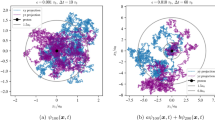Abstract.
A Bayesian approach is developed to determine quantum-mechanical potentials from empirical data. Bayesian methods, combining empirical measurements and a priori information, provide flexible tools for such empirical learning problems. The paper presents the basic theory, concentrating in particular on measurements of particle coordinates in quantum-mechanical systems at finite temperature. The computational feasibility of the approach is demonstrated by numerical case studies. Finally, it is shown how the approach can be generalized to such many-body and few-body systems for which a mean field description is appropriate. This is done by means of a Bayesian inverse Hartree-Fock approximation.
Similar content being viewed by others
Author information
Authors and Affiliations
Additional information
Received June 25, 1999; revised February 25, 2000; accepted for publication April 29, 2000
Rights and permissions
About this article
Cite this article
Lemm, J., Uhlig, J. Bayesian Inverse Quantum Theory. Few-Body Systems 29, 25–52 (2000). https://doi.org/10.1007/s006010070007
Issue Date:
DOI: https://doi.org/10.1007/s006010070007




